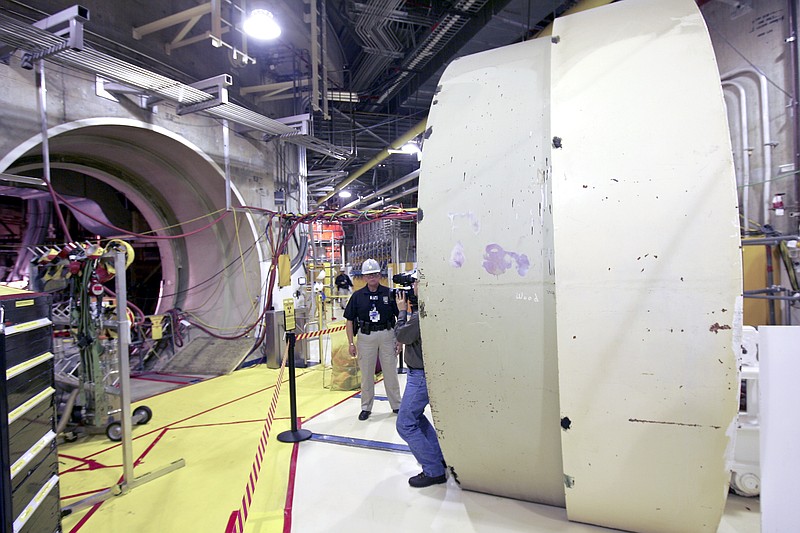MOREReport calls for nuclear safety plan overhaul
Browns Ferry Nuclear Plant had far more problems during recent tornadoes than TVA told the public after winds took down power lines and the plant went into automatic shutdown.
Tennessee Valley Authority statements after the late April tornadoes indicated everything functioned as it should when all three reactors shut down when the power they generated had nowhere to go because more than 300 monster power towers had been blown down.
But documents the utility is required to submit to the Nuclear Regulatory Commission show reactor operators became distracted while manually operating cooling water flow to the Unit 1 reactor and water began boiling off faster than it was being replaced.
Additionally, a valve failed, a diesel-driven fire pump failed, the diesel-driven generator for the security station failed, the warning sirens were lost, power to the chemical lab was lost, and an emergency diesel generator keeping cool water flowing to one of three reactors shut down because of voltage fluctuations caused by a fluid leak after a brass fitting broke.
TVA's nuclear spokesman Ray Golden said Wednesday TVA filed appropriate licensee reports to the NRC that appeared on the regulator's public website, and he talked with a number of reporters in the days after the April tornadoes.
"I don't think anywhere we use terms like 'flawless' or 'perfect.' We did use terms like 'the equipment worked as designed' and 'the plant was safely shut down and cooled down,'" he said.
"All this said, given the multiple safety systems and the backup systems for pumping water, supplying power ... at no time was the plant, or the public, in danger," he added.
Station blackout
Nuclear plants generate their own power, as well as power for communities. So when the plants blow a fuse - or go into "automatic shutdown" as the industry terms it - they are just as much without power as their customers are.
That also means the pumps don't circulate cooling water to the reactors and the pools where spent - but still hot - radioactive fuel rods are stored. That's why emergency diesel generators and backup four-hour batteries at the plant and other TVA nuclear plants are important.
Browns Ferry ran on diesel generators' power for five days after the shutdown.
Those backup power systems also open and close valves for all types of equipment in the plants and run security systems.
When one of the generators failed at Browns Ferry, there was a temporary loss of shutdown cooling for one reactor for about 47 minutes, but the water level in the reactor never got near the boiling point, officials said.
So when the cacophony of systems began showing signs of trouble at Browns Ferry in late April and early May after the tornadoes, it's little wonder there were distractions in the control room of Unit 1.
"Operators had taken manual control of the system, as required by the procedure, and ... got distracted, allowing water make-up to be less than it should have been," Golden said.
The water in the reactor boiled low enough to trigger another shutdown alarm in the control room, but Golden said boiling water still covered the reactor fuel.
It was a problem with the operator, not generator failure, he said. When the alarm sounded, operators became undistracted and reset the control to add more "make-up water," Golden said.
"Had the operator not taken that action, and water level continued to drop, it would have gotten to the next alarm set-point, which would have resulted in large volumes of water automatically being injected into the reactor with no operator action required. This ensures on-going safety," Golden said.
But Golden acknowledged that human error was in play and operators had set the manual control too low. And he said the event, like all identified issues in the reports, was entered into the plant's correction action program.
"Going forward, this event will be trained on in unit-specific control room simulators to enhance operator performance," he said.
Assessing trouble
David Lochbaum, director of the Union of Concerned Scientists' Nuclear Safety Project, used to work at Browns Ferry Nuclear Plant, and he also has been a Nuclear Regulatory Commission training officer.
"I was a little surprised by the list of equipment that didn't work," Lochbaum said after reading TVA's reports to the NRC. "The diesel generator for the security equipment not working was surprising. Fortunately, the plant was able to safely shut down despite all those problems."
But he said he was most surprised by the operators' distraction.
"That's the only reason the operators are there," he said. They need to make sure automated systems work.
"When the plant's running, there are three key things to watch: power, pressure and [water] level. When the reactors shut down, the power goes to zero, so now you're only left with two things - pressure and level. And they lost track of one of them."
NRC typically does not comment on individual event reports, and the regulatory agency has not yet filed a response to TVA's most recent reports.
Browns Ferry already is under heightened scrutiny by the NRC after a cooling water valve failed to operate during a routine manual shutdown in the fall and it came to light that the valve may not have functioned for about 18 months.
"Brown's Ferry is already in the NRC doghouse, so to speak," said Lochbaum. "When you keep having events like this one, it becomes harder to convince anybody that you can do better."
Golden defended TVA and the plant.
"All of these events and issues did arise during the aftermath of the April 27 tornadoes, but overall the plant design, equipment and personnel responded well to the challenging event. As a continuous learning organization, we are always looking to improve our performance," he said.
